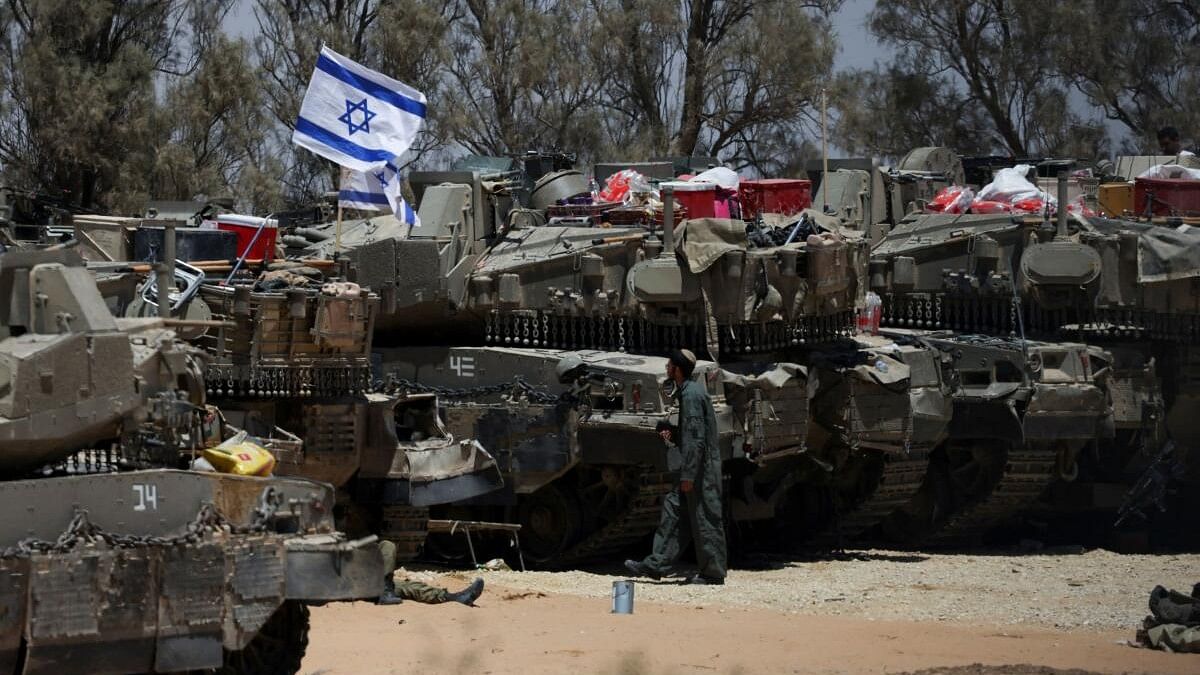
An Israeli soldier walks near military vehicles, amid the ongoing conflict between Israel and the Palestinian Islamist group Hamas, near Israel's border with Gaza in southern Israel.
Credit: Reuters Photo
Israel's national security adviser, Tzachi Hanegbi, said Wednesday that he expected Israel's military operations in the Gaza Strip to continue through at least the end of the year, appearing to dismiss the idea that the war could come to an end after the military offensive against Hamas in the city of Rafah.
"We expect another seven months of combat in order to shore up our achievement and realize what we define as the destruction of Hamas and Islamic Jihad's military and governing capabilities," Hanegbi said in a radio interview with Kan, the Israeli public broadcaster.
Israeli officials have told the public to expect a protracted campaign that would progress in phases toward lower-intensity fighting. Hanegbi's assessment, however, appeared to be at odds with earlier projections by Prime Minister Benjamin Netanyahu, who said in April that the country was "on the brink of victory" in its war against Hamas. In recent weeks, Israeli troops have repeatedly returned to areas of northern Gaza in an attempt to tamp down a renewed insurgency there by Hamas militants.
Israel faces rising pressure to wind down its campaign and reach a cease-fire deal with Hamas that would include the release of hostages held in Gaza. The chief prosecutor of the International Criminal Court has requested arrest warrants for Israel's prime minister and defense minister; the World Court has ordered Israel to rein in its offensive in Rafah; and the Biden administration has expressed frustration with the lack of a clear Israeli endgame for postwar Gaza.
The outcry has only sharpened in recent days, after an Israeli bombardment -- which sparked a conflagration in an area where displaced Palestinians were sheltering -- killed at least 45 people in western Rafah, according to the Gaza Health Ministry. The Israeli military said the airstrike had targeted two Hamas commanders and that it was looking into what could have caused the blaze.
At least 290 Israeli soldiers have been killed in Gaza and over 3,600 wounded since the ground invasion began in late October, according to military statistics. The military said another three soldiers were killed and three more seriously wounded Tuesday in Rafah, where Israeli forces have been advancing in a long-anticipated assault.
Over 1 million Palestinians have fled the city in the face of the onslaught, according to the United Nations. Israel has called the operation essential to take out Hamas forces arrayed in the city, while the Biden administration and human rights groups have voiced concern over the plight of the civilians who had sought shelter there.
Netanyahu has repeatedly said his government sees it as critical to seize control of a buffer strip along the southern edge of Gaza, from Israel's border to the Mediterranean, a roughly 9-mile-long zone between Gaza and Egypt known in Israel as the Philadelphi Corridor.
Israel's military now controls around 75% of the corridor, Hanegbi said. He said that Israeli control of the area was critical to prevent cross-border smuggling that would allow Hamas and other Palestinian militant groups to rearm.
Over 36,000 Palestinians have been killed since the Hamas-led surprise attack on Israel on October 7, according to Gaza health officials. Roughly 1,200 people, mostly civilians, were killed in Israel during the attack, according to Israeli authorities, and Palestinian militants took around 250 people back to Gaza as hostages.
Since the Israeli operation in the Rafah area began in early May, ground forces have slowly advanced toward the coast, with firefights generally confined to neighborhoods in eastern Rafah. But deadly strikes over the past few days appear to have targeted western Rafah and nearby areas where Israel has not formally ordered an evacuation. Dozens of Palestinians have been killed over the past few days in Rafah alone.
Two days after the strike in western Rafah that killed dozens, Gaza health officials said another bombardment had taken place, killing at least 21. The Israeli military denied striking within the borders of the Israeli-designated humanitarian zone for evacuees in Muwasi, which is northwest of Rafah.